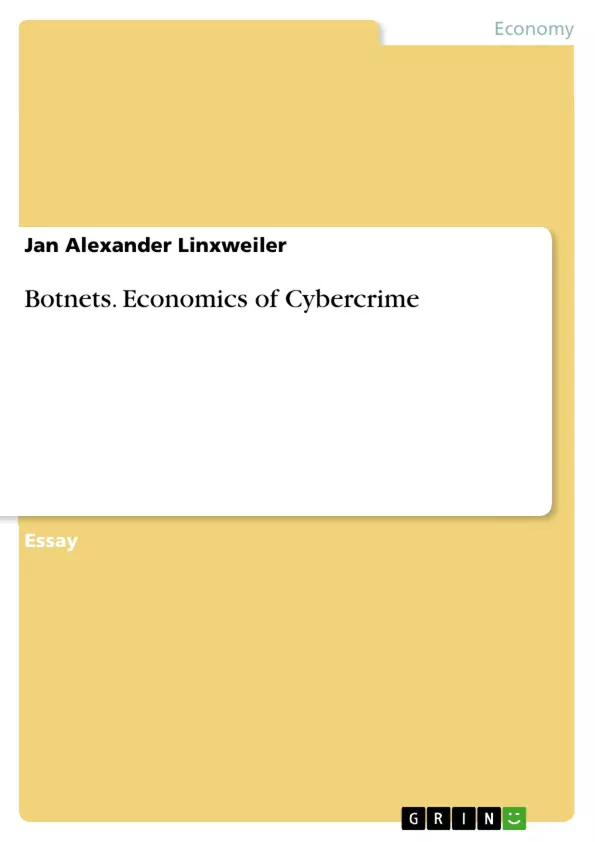While crime is not considered something that is abstinent from the business world, it is also seldom realized as its own economy. The following paper will present an economic approach to crime in the modern area. The sphere of cybercrime, in particular the case of Botnets is going to be used to analyze a rational choice approach to economics in crime.
In doing so, the basic model of rational choice economics in crime is presented. Then the case of Botnets is introduced and used to illustrate supporting and opposing arguments for the model. The paper will conclude that cybercrime – especially the case of botnets – is driven by rational choice and thus the idea of economic efficiency. The benefit of this conclusion results in the possibility of counter-measures to disrupt these criminal markets and lower profitability.
Inhaltsverzeichnis (Table of Contents)
- Introduction
- Background
- The Model of Economics of Cybercrime
- Botnets – a prime example for cybercriminal activity
- Supporting Arguments
- Existing underground market
- Benefits are calculable
- Reported Cases of extortion in the study by Segura & Lahuerta
- Opposing Arguments
- Punishment as a deterrence
- Origin of Cybercrime based in activism
- Conclusion
Zielsetzung und Themenschwerpunkte (Objectives and Key Themes)
This paper examines the economics of cybercrime, specifically focusing on botnets, through the lens of rational choice theory. It aims to demonstrate that cybercrime, particularly botnets, is driven by rational economic decisions and thus operates within an efficient market framework.
- Rational choice theory in the context of cybercrime
- Botnets as a prime example of cybercriminal activity
- The economic efficiency of cybercrime markets
- The role of costs and benefits in criminal decision-making
- Potential countermeasures to disrupt criminal markets and reduce profitability
Zusammenfassung der Kapitel (Chapter Summaries)
The introduction sets the stage by arguing that crime can be understood as its own economy. The paper then introduces the model of rational choice economics in crime, focusing on the idea that individuals act rationally to maximize expected utility. This model is then applied to the case of botnets, a prominent form of cybercrime.
The background chapter explores the model of economics of cybercrime in detail, defining criminal behavior as a deviation from societal norms and lawful behavior. It emphasizes that crime can be considered a market driven by economic principles, with individuals motivated by maximizing utility.
The supporting arguments section examines evidence that suggests botnets are driven by economic motivations. It discusses the existence of underground markets for botnets, the calculability of benefits and costs, and the reported cases of extortion through botnet-powered DDoS attacks.
The opposing arguments chapter explores alternative perspectives on the motivations behind botnets, such as the deterrent effect of punishment and the possibility of cybercrime rooted in activism.
Schlüsselwörter (Keywords)
The main keywords and focus topics of this paper include cybercrime, botnets, rational choice theory, economics of crime, DDoS attacks, underground markets, extortion, and economic efficiency.
Frequently Asked Questions
What is the economic approach to cybercrime?
It views cybercrime as a rational market driven by economic efficiency, where criminals weigh costs against potential benefits.
Why are botnets used as a prime example of cybercrime economics?
Botnets demonstrate highly organized underground markets, calculable profit margins, and professional criminal operations like extortion.
Does rational choice theory apply to botnet operators?
Yes, the paper argues that botnet activity is driven by the maximization of expected utility and economic efficiency.
What are the arguments against the economic model of cybercrime?
Some argue that punishment acts as a deterrent or that certain cybercriminal activities are rooted in activism rather than profit.
How can botnet profitability be lowered?
By implementing countermeasures that disrupt criminal markets, increase the cost of operation, and lower the success rate of attacks like DDoS.
- Citar trabajo
- Jan Alexander Linxweiler (Autor), 2016, Botnets. Economics of Cybercrime, Múnich, GRIN Verlag, https://www.grin.com/document/342128



